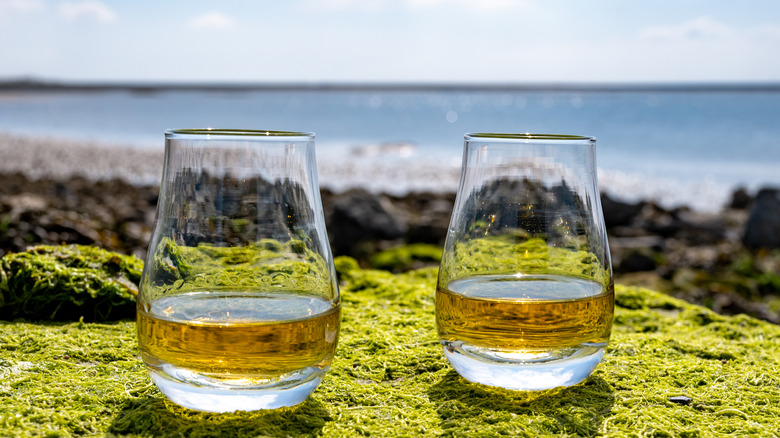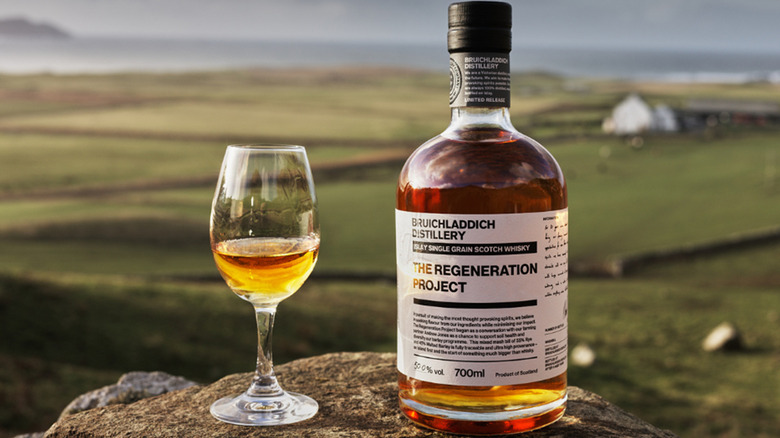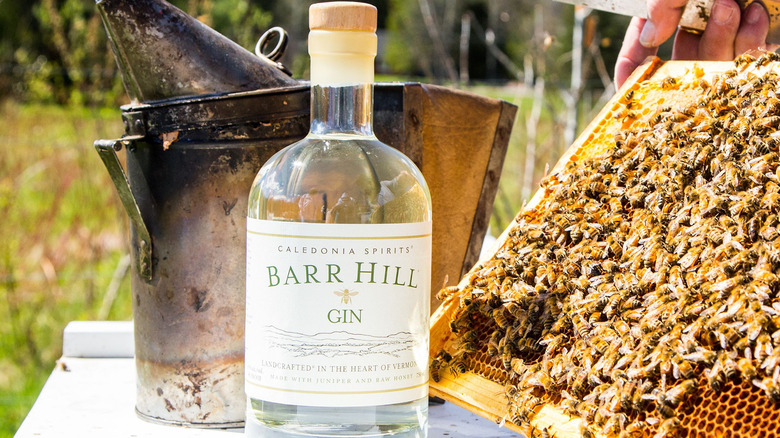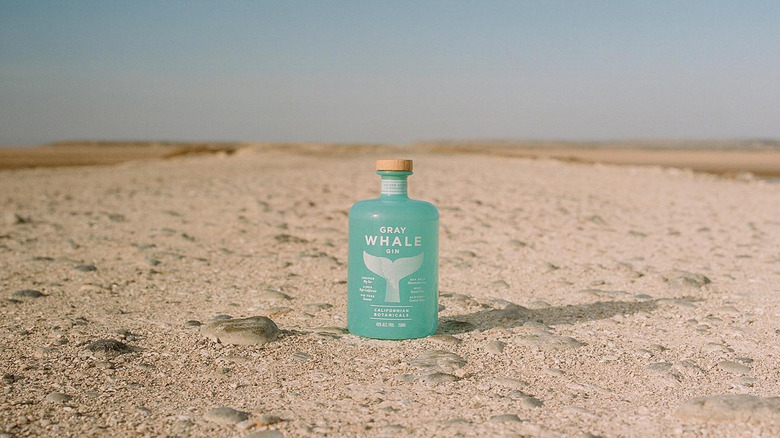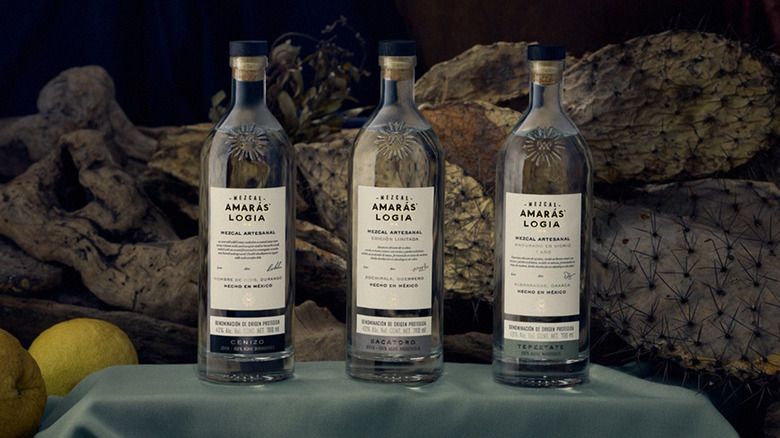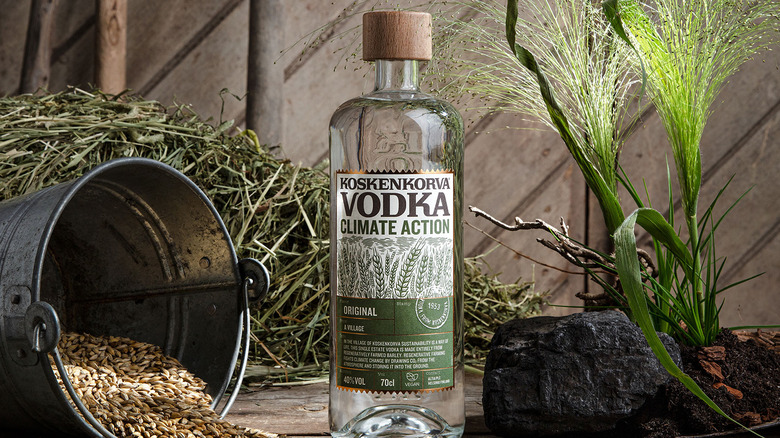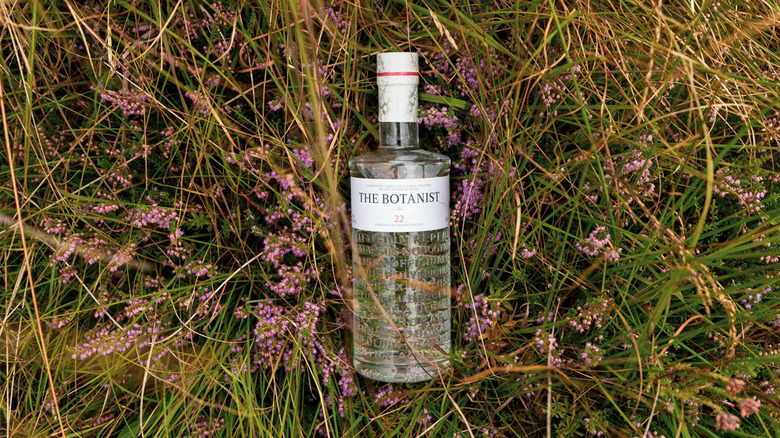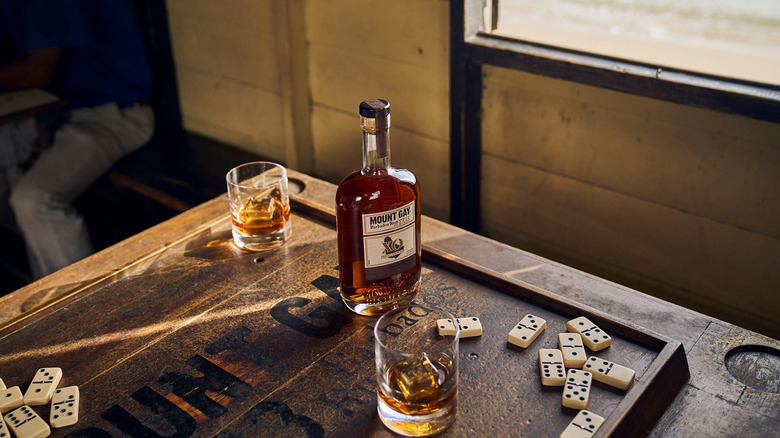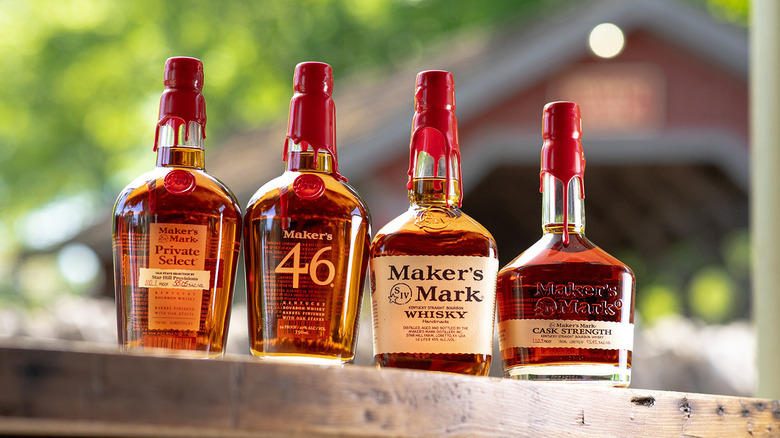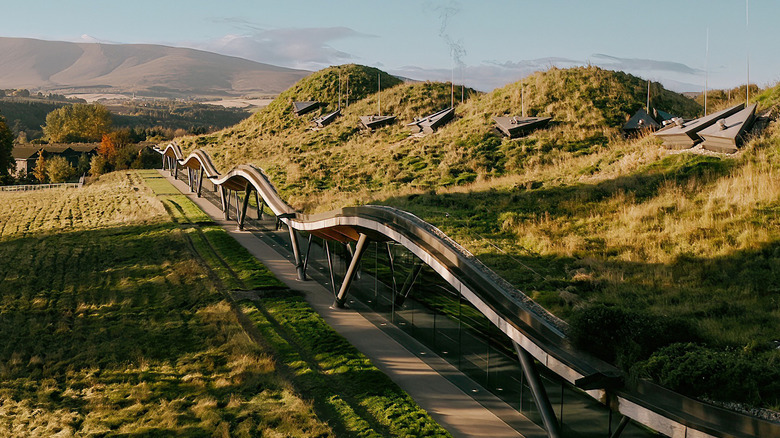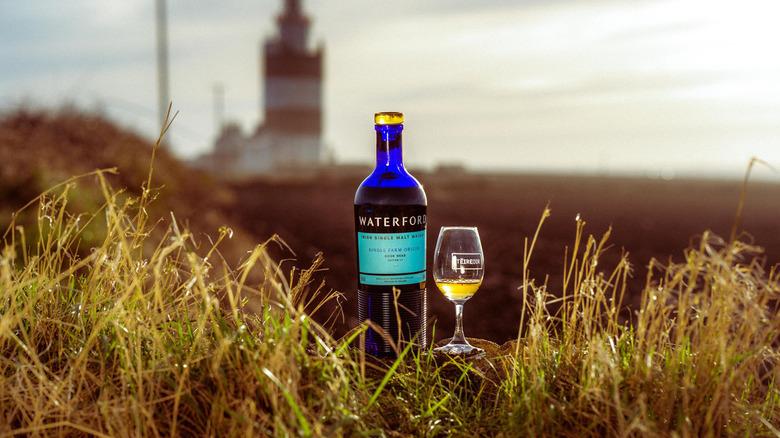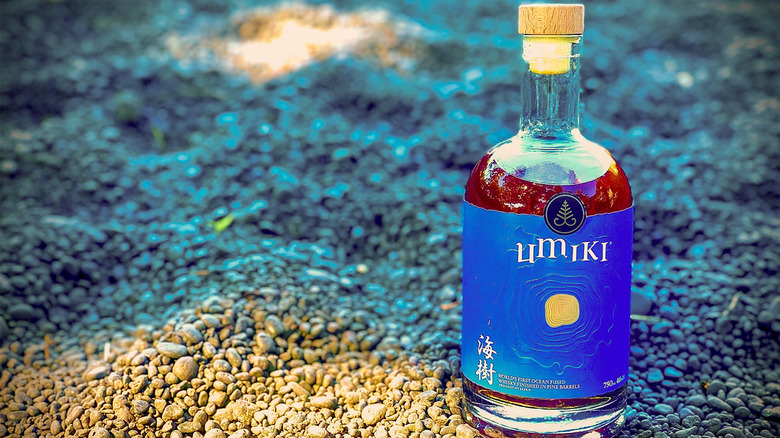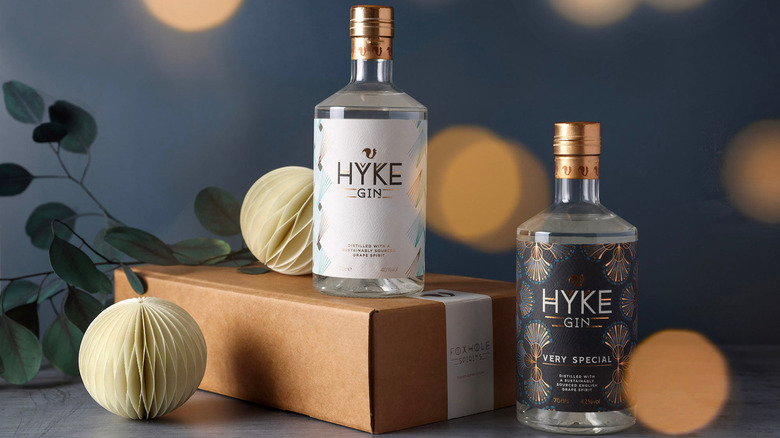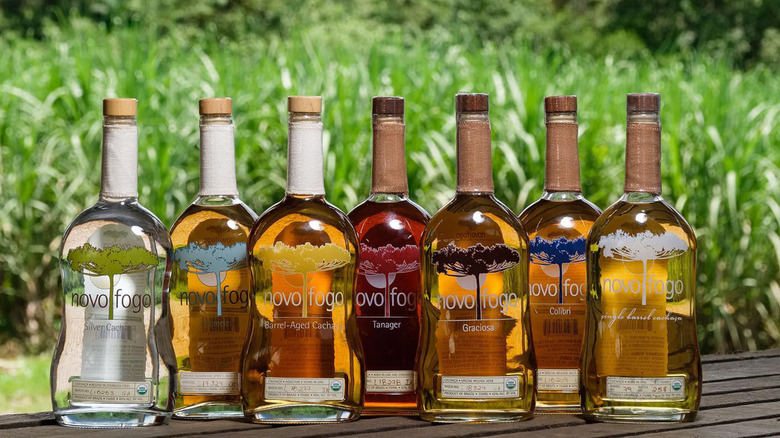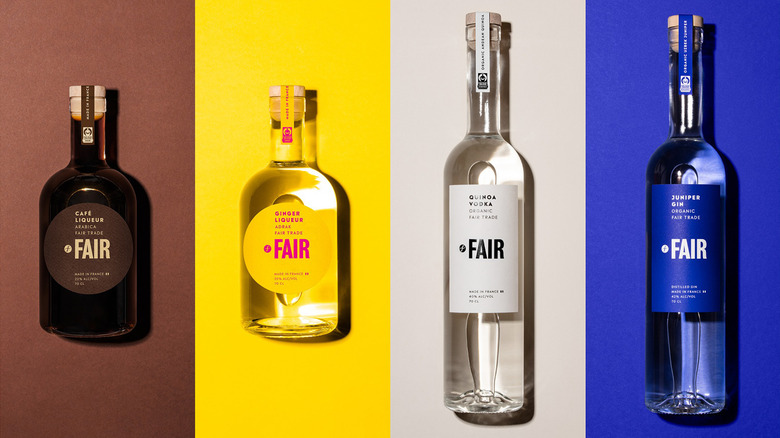14 Sustainable Spirits Brands To Toast Earth Day
Doing your small part in helping curb the ongoing climate crisis has infiltrated nearly every sector of consumerism. Buying organic produce, humanely raised meat, specialty, and renewable clothing items are just some of the ways sustainability has become a major factor in how we shop, and buying booze is no different.
Unfortunately, distilling spirits is generally not the most sustainable, eco-friendly operation. There are many different materials that go into it such as growing grains, harvesting plants, using single-use wood for barrel-aging, wasteful packaging, and many others. However, the importance of looking at how production methods will affect the future is becoming more of a concern to spirits brands, some of which are making sustainability the foundation of their entire business model.
With so many spirits brands to buy on store shelves and online, supporting brands that produce the products ethically with the environment, people, and animals in mind is important. This has led to many innovative brands and products that are unique, delicious, and a simple way to reduce your own carbon footprint and enjoy some great spirits simultaneously. Here are the brands to check out to do so.
Bruichladdich Distillery Company
Many brands of scotch whisky have long histories and are kept alive by a dedication to tradition. Bruichladdich, however, is an ultra-modern scotch maker that was resurrected in 2001. The Bruichladdich Distillery, which is B Corp certified, is located on the isle of Islay, a region of scotch known for its intensely peaty and smoky takes on the spirit. Bruichladdich offers much more than peated whisky, though, with many different expressions in its lineup. The one constant in every product is an emphasis on the barley that goes into every whiskey and mindfulness of its surrounding environment.
The Bruichladdich Distillery currently operates through 100% renewable energy and plans on completely decarbonizing its production by the year 2025 through a conversion to hydrogen-based power. The sustainability efforts do not stop there, though. All Bruichladdich whiskies are packaged without unnecessary materials such as tins or boxes that hold the glass bottle. This is rare for most single malt brands, but it does reduce a lot of waste. This brand of scotch reestablishes the connection spirit makers are supposed to have with the resources required to operate. A love and protection of the Islay terroir not only makes for an admirable operation but also better whisky as a whole.
Barr Hill
Bar Hill is a spirits brand owned by Caledonia Spirits, located in Vermont. Bar Hill produces three different products, a flagship gin, a barrel-aged gin, and a vodka. All three bottles by Bar Hill are a celebration of and an effort to protect bees and their habitats throughout the northeast.
Bar Hill Gin is a very unique expression that is made with raw honey in addition to juniper and other botanicals commonly found in gin. The raw honey flavor is the perfect rounder to the sharp juniper to make a gin with an extra layer of depth and complexity. This is the same gin that is aged in charred oak barrels to make the Tom Cat expression. Although vodka is a flavorless spirit, Bar Hill still finds a way to celebrate its hardworking bees by distilling the vodka directly from raw honey to make a very soft expression that bursts with floral notes.
In addition to the very special spirits, Bar Hill sponsors Bee's Knees Week annually, a week-long event that inspires many renditions of the classic cocktail as well as raises awareness of the challenges facing bee habitats and money to help support them. All you have to do is make yourself a bee's knees, share it on social media with the event's hashtag, and Bar Hill plants 10 square feet worth of a bee sanctuary. In 2022, Bar Hill committed over 250,000 square feet, which is nearly six acres.
Gray Whale Gin
Gray Whale Gin is another gin brand inspired by an animal species and is also a reflection of the life of the gray whale it celebrates. The brand came about out of a fascination with the gray whales found on the Pacific coast off of the Northwest United States.
This expression of gin is actually an expression of these whales' annual migration route, which has been taking place for approximately 30 million years. Gray Whale Gin is made with botanicals found along this migration pattern. These include, for example, limes from the Temulca Valley, fir trees from Sonoma, sea kelp, almonds, and mint. This makes for a distinctly Californian gin and one that also provides massive contributions to protecting the magnificent beings that inspire it.
Gray Whale Gin is a partner of Oceana, an ocean conservation organization that works to keep oceans as healthy and habitable as possible. Through this partnership, Gray Whale Gin donates a minimum of 1% of its total annual sales to Oceana, so purchasing a bottle directly supports this cause.
Mezcal Amaras
Sustainability in the world of agave spirits is a very consequential issue. As macro-producers make larger amounts of tequila and mezcal in shorter amounts of time, farming, the environment, small-scale producers, quality, and tradition all suffer. Luckily, Mezcal Amaras is dedicated to supporting smaller producers of mezcal, invigorating the community surrounding them, and protecting the resources that go into making this great spirit.
Mezcal Amaras both produces its own mezcal as well as buys mezcal directly from local mezcaleros. At least 20% of each bottle sold by the brand is recycled back into efforts to promote a more socially and environmentally conscious mezcal industry. This mindfulness reigns true from the beginning of the distillation to the end, as for each agave plant harvested to make a batch of mezcal, another 10 are planted. Furthermore, the agave fibers that are pressed to extract their juice are used as compost as well as to make bricks. Since Mezcal Amaras was established in 2011, the brand has planted over 300,000 agave plants, contributed 6,300 trees to reforestation, and offset over 3,600 tons of carbon. The brand has also been recognized as a 100% carbon-neutral operation as well as become an official ally of the World Wildlife Fund.
Koskenkorva
Koskenkorva is a brand of vodka owned by Nordic Spirits that is a direct mitigation of the climate crisis. The main way this brand does this is through regenerative agriculture, an innovative farming method that removes carbon dioxide from the atmosphere and stores it underground.
Not only does this reduce carbon emissions, but it also correlates to healthier soil, and therefore healthier crops. This vodka and spirits brand is part of the Baltic Sea Action Group's Carbon Action Platform, an organization that works to fight the climate crisis through this new way of farming. Every bottle of Koskenkorva Vodka Climate Action purchased directly lends a hand to fighting climate change as well as makes a great addition to your home bar. You can purchase this vodka in many places across the U.S., including through Drizly, Total Wine (in some states), and other local liquor stores. Check the brand's site for full details on your state's availability.
The Botanist
While Islay, Scotland is most widely known for its distinct and bold scotch whisky, The Botanist is a gin brand that is putting the abundance of natural resources on the isle to make great gin. The Botanist Gin is a delightful culmination of the many wild botanicals that grow on Islay, containing 22 hand-foraged herbs and spices that make for a botanically rich gin like none other. The Botanist is an instantaneous way to enhance any gin cocktail, especially ones that are spirit-forward.
The rugged and diverse terrain of Islay is exactly what The Botanist strives to retain. The brand's gin is actually distilled at the Bruichladdich Distillery, which is B Corp certified. This brand's main contribution to sustainability comes through The Botanist Foundation, which conducts research on sustainable agriculture and promotes biodiversity.
The Botanist's flagship gin is its most commonly available, but its Plant Conservation edition supports its agricultural initiatives, particularly the Botanic Gardens Conservation International. Proceeds from this limited release go to this global organization that works to save endangered plant species around the world.
Mount Gay
Mount Gay is a brand of Barbados rum that has been distilling rum since all the way back in 1703. Since then, the brand has used the very same well that was dug over three centuries ago. One might think that a spirits brand as rooted in tradition as Mount Gay may be hesitant to employ a more modern and sustainable approach to its production, but that is exactly what Mount Gay is doing.
The brand is aware of the impact it can have on its surrounding environment and operates based on five pillars of eco-friendly principles. It is these principles that keep Mount Gay going, as they are keen to ensure the lifespan of its brand continues. The five pillars are agriculture and biodiversity, energy, water, carbon footprint, and social responsibility, all of which include an overall aim of self-sufficiency through organic fertilizers and renewable energy while reducing its carbon footprint. Apart from this awareness of how current operations impact the future, Mount Gay also makes exceptional products. Its flagship Eclipse, Black Barrel, and XO bottles are all superb expressions of Barbados rum and the many special edition releases aged in various barrels make this brand well worth supporting.
Maker's Mark
Maker's Mark is one of the most iconic bourbon brands on the market. Although the brand is relatively young compared to some of its competitors, it has cemented itself as a must-visit on the Kentucky Bourbon Trail. What you will find if you do stop at the distillery in Loretto, Kentucky is an operation dedicated to sustainability throughout the entirety of its process.
Not only does Maker's Mark grow all of its grains on-site, but it also has access to its very own source of limestone water. Furthermore, the distillery plants native grasses on its property to promote biodiversity and keep its livestock healthy and its water clean. One aspect of making bourbon that is not so sustainable is the use of oak barrels, which cannot be reused after maturing whiskey. To counter this, Maker's Mark replants white oak trees on its property to cut the loss.
Even after its bourbon is ready to be bottled, Maker's Mark still keeps the environment in mind. All bottle labels are printed on-site to reduce emissions from transportation, and the distillery began melting its iconic red wax at a lower temperature to make it more easily recyclable. The self-sufficiency is really what makes Maker's Mark such a sustainable brand, and its efforts have been recognized with a B Corp certification.
The Macallan
The Macallan is among the most revered scotch whisky brands, producing countless excellent expressions of many different age statements, aging methods, and price points. Some bottles in The Macallan lineup are aged for over 25 years, but whisky is not the only thing this brand thinks about in the long term.
Given the amount of scotch The Macallan produces, a lot of space is required. Luckily, the nearly 500-acre estate, newly opened in 2018, is a state-of-the-art facility fit with a grass-growing roof that supports ecosystems full of plant, insect, and bird life. The brand also has its very own Habitat Management Plan put in place to ensure all life on the property thrives and is never negatively affected by the scotch-making operation.
Other ways The Macallan practices sustainability are by ethically sourcing its American and European oak casks as well as repurposing those casks for packaging. This unique and clever way of waste reduction is an example of how every product of The Macallan is part of a continuous circle of resourcefulness and environmental sensitivity.
Waterford Whiskey
Many of the popular Irish whiskeys on the market are blended and single-pot still whiskeys. However, single-malt Irish whiskeys and their complexity deserve more recognition; Waterford Whiskey is a prime example. Waterford Whiskey claims it approaches whiskey-making the same way winemakers approach their craft. This means championing its terroir and growing the best barley possible.
Waterford Whiskey's distillery is found on the southeast coast of Ireland, a location that is more temperate than most other parts of the country because of its proximity to the Gulf Stream. This makes for extra rich soil and therefore stronger, more robust-tasting barley. One hundred percent of the barley that goes into each Waterford Whiskey is grown by local Irish farmers, an employment contrary to the mass production operations by the big brands across Ireland. The winemaking influence comes through Waterford's lunar planting cycles, contributing to better barley and whiskey. It turns out that Waterford never explicitly set out to be the sustainable whiskey maker that it is, and the locally, organically, and bio-dynamically grown barley was simply done to make a better product, a testament to the many benefits of environmentally-conscious distilling.
Yoshino Spirits Co
Yoshino Spirits Co is a spirits brand that has created a sustainably-minded whiskey unlike any other before it. The product is Umiki, a Japanese whisky made with ocean water, an innovation that can immensely reduce the environmental impact of whiskey-making. The ocean water is used to help blend Japanese malt whiskys and imported single grains. The blend is then aged in pine barrels made from locally grown trees, another way Umiki stays sustainable.
The use of water and wood in the process of making whiskey is probably its two most wasteful and non-eco-friendly aspects. The best possible water is widely considered to be essential to making a good product, so pure mineral water, which is not a naturally restored source, is normally used throughout production. The most commonly used barrels are American and European oak, which have to be shipped overseas to reach a distillery belonging to Yoshino Spirits Co in Japan. Locally sourcing renewable water and utilizing the abundance of local pine make Umiki a truly unique-tasting whiskey and one that keeps the environment thriving in return.
Foxhole Spirits
Foxhole Spirits is another brand that makes very unique spirits by using surplus food items. The most popular bottle in the brand's lineup is Hyke Gin, which is made using leftover table grapes sourced from supermarkets across the United Kingdom. Hyke Very Special Gin is distilled from crushed grapes sourced from English winemakers, a surplus that would normally just be discarded.
Using these grapes as the base spirit for gin is completely different from most producers' usual neutral grain spirits. The grape base gives Hyke gins their very specific character, which is enhanced by the infusion of sustainably sourced botanicals.
Foxhole Spirits prides itself on repurposing the estimated millions of usable grapes that are normally thrown away yearly to make its gins and not using any single-use materials. In fact, in the first two years of production, Hyke Gin utilized over five million grapes that would otherwise pile in landfills. If gin is not your thing, you can still support this awesome and resourceful brand by checking out its Mad City Botanical Rum, made from the molasses leftover from sugar cane processing.
Novo Fogo
Cachaça is a spirit not very well known in the U.S., but it is massively popular in South America, especially in Brazil. Cachaça, like rum, is distilled from pressed sugar cane juice, but cachaça has a more complex, more vegetal, earthy flavor. A lot of this sugar cane is required to make cachaça, which is why Novo Fogo is working to aid reforestation so they can make more of its spirit for longer and the environment does not have to pay for it.
Novo Fogo, located in Morretes, Brazil, gets its sugar cane from the Atlantic Forest, which has unfortunately lost over 80% of its original size to deforestation, notes the brand's site. Because of this, thousands of plant and animal species are likely to become endangered. To make matters worse, this rainforest is under further attack by the cachaça industry because of the need for wood aging barrels.
This is why Novo Fogo started a reforestation project to help curb this decline, and, hopefully, eventually turn that curve upside down. Part of this effort includes partially utilizing American oak instead of relying entirely on indigenous trees for barrel aging, as well as working with the Brazilian government to ensure all cachaça producers harvest trees from the rainforest legally. If you have never had cachaça before, there is no better place to start, in more ways than one, than Novo Fogo.
FAIR
FAIR is a brand of spirits that ensures that all of its products are fair trade certified, meaning every step of the process only has positive impacts and all of the people involved in production are treated well and with respect. The main realm emphasized in this approach to making spirits is through supporting farmers.
There are many different spirits in this brand's catalog, including gin, rum, a variety of liqueurs, and the very first quinoa-based vodka, according to the brand's site. The materials needed to make these spirits are paid for at fair prices so that the people who grow them can sustain their own livelihood and profession. Additionally, all spirits by FAIR are completely organic, vegan, entirely non-GMO, and all-natural.
FAIR operates its production in accordance with Sustainable Development Goals issued by the United Nations, which aims to promote economic growth, environmentally friendly sourcing and operations, and sanitation. FAIR distills its spirits in France, but the farmers and communities it supports span the globe, including Bolivia, Belize, Sri Lanka, and Uzbekistan, to name a few.
